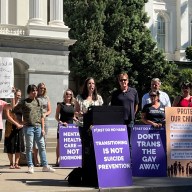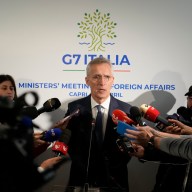COLOMBO, Sri Lanka – Volunteers dug mass graves in the marshes of Sri Lanka’s northern war zone Monday as they buried hundreds of civilians killed in artillery attacks that the UN characterized as a “bloodbath.”
A doctor in the war zone said as many as 1,000 civilians may have been killed in two days of shelling that marked some of the worst violence in this Indian Ocean island country since the civil war flared up again more than three years ago.
With the civilian death toll skyrocketing, the Tamil Tiger rebels and a coalition of international human rights groups separately called for the UN Security Council to urgently hold talks on the conflict. But with several countries protesting such talks, that seemed unlikely.
The government and the separatist rebels both denied responsibility for the artillery attacks that struck the tiny sliver of northeast coast still held by the rebels in two waves. The worst barrage pounded the area, which holds an estimated 50,000 trapped civilians, from Saturday night until Sunday morning, health officials said.
Another attack hit the area overnight Sunday, landing in a newly demarcated “safe zone” where the government had urged civilians to gather, according to Dr. V. Shanmugarajah, who works at a makeshift hospital in the area.
A total of 430 ethnic Tamil civilians, including 106 children, were either brought to the hospital for burial or died at the facility, he said. More than 1,300 wounded came to the hospital as well, he said.
But, he said, the death toll was likely far higher because many of those killed would have been buried in the bunkers where they were slain, and many of the gravely wounded never made it to the hospital for treatment.
“There were many who died without medical attention,” Shanmugarajah said. “Seeing the number of wounded, and from what the people tell me, I estimate the death toll to be around 1,000.”
Volunteers dug mass graves in the marsh near the hospital, putting 50 to 60 bodies in each pit, he said. One of the hospital’s nurses was killed along with his family as they sheltered from the onslaught in a trench that was then filled with soil and turned into their grave, he said.
“The UN has consistently warned against the bloodbath scenario as we’ve watched the steady increase in civilian deaths over the last few months,” UN spokesman Gordon Weiss said. “The largescale killing of civilians over the weekend, including the deaths of more than 100 children, shows that that bloodbath has become a reality.”
The hospital in the war zone was so overwhelmed that many of those wounded in Saturday’s barrage had still not been treated Monday morning. Every time Shanmugarajah left the operating room, he was mobbed by those seeking treatment, he said.
“The hospital death rate is increasing, but we are helpless,” he said.
People were begging the doctors to send them away on a Red Cross ship that comes every few days to evacuate the wounded, saying they could not bear the shelling anymore, he said.
Reports of the fighting are difficult to verify because the government bars journalists and aid workers from the war zone.
UN figures compiled last month showed that nearly 6,500 civilians had been killed in three months this year as the government drove the separatist rebels from their northern strongholds and vowed to end the war.
Selvarasa Pathmanathan, a top rebel official, appealed to the international community and the Security Council to take up the war “as a matter of urgency,” according to a statement posted on the rebel-linked website TamilNet.
Human Rights Watch, Amnesty International and other rights groups called on Japan, the largest international donor to Sri Lanka, to press the UN to urgently address the war, and British Foreign Secretary David Miliband called for discussions to be held at all levels of the UN on the plight of the civilians.
“No one can be in any doubt that this is an issue that deserves the international community’s attention,” Miliband told reporters at UN headquarters in New York.
Sri Lanka is not on the Security Council agenda because Russia, China, Japan and Vietnam consider the fighting an internal matter.
The rebels, listed as a terror group by the U.S. and the EU, blamed the artillery assaults on the government, with Pathmanathan calling them “a deliberate massacre of Tamil civilians by the Sri Lankan armed forces.”
Human Rights Minister Mahinda Samarasinghe denied the government was responsible for any artillery attacks and claimed health officials in the area were under pressure from the rebels to lie.
“We have consciously avoided firing into the areas where civilians are forcibly held by the LTTE,” he said, referring to the rebels by the acronym of their formal name, the Liberation Tigers of Tamil Eelam.
Rights groups have accused the government of bombing and shelling the war zone despite pledges to stop using heavy weapons, and accuse the rebels of holding civilians as human shields and shooting at many who tried to flee.
The government has brushed off international calls for a humanitarian truce, saying any pause in the fighting would give the rebels time to regroup and prolong a war that has already lasted more than a quarter century.















